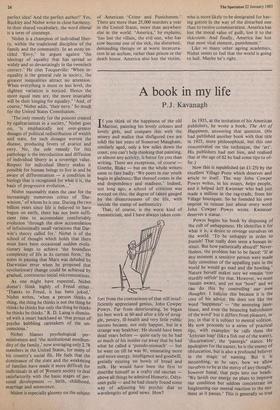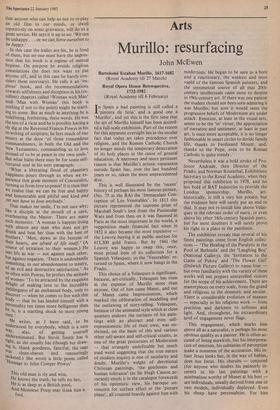A book in my life
P.J. Kavanagh Iyou think of the happiness of the old Matisse, painting his lovely colours and lovely girls, and compare this with the misery and malice that disfigured (we are told) the last years of Somerset Maugham, similarly aged, only a few miles down the coast, you can't help thinking that painting, or almost any activity, is better for you than writing. There are exceptions, of course — Goethe, Blake — but on the whole writers seem to fare badly: 'We poets in our youth begin in gladness;/But thereof comes in the end despondency and madness.' Indeed, not long ago, a school of criticism was erected on this; the degree of talent gauged by the disastrousness of the life, with suicide the stamp of authenticity.
That, of course, is the worst kind of romanticism, and I have always taken corn- fort from the contrariness of that still insuf- ficiently appreciated genius, John Cowper Powys. Far from deteriorating, he began his best work at 60 and after a life of strug- gle, penury, ill-health and very little rublic success became, not only happier, but in a strange way healthier. He should have been dead years before — quite early on he had so much of his insides cut away that he had what he called a 'pseudo-stomach' — but he went on till he was 91, emanating more and more energy, intelligence and goodwill, genially existing on bowls of bread and milk. He would have been the first to describe himself as a crafty old saurian above all things he admired Homeric, Odys- sean guile — and he had clearly found some way of adjusting his psychic dial to wavelengths of good news. How?
In 1935, at the invitation of his American publishers, he wrote a book, The Art of Happiness, answering that question. (He had published another book with that title in 1923, more philosophical, but this one concentrated on the technique, the 'art'. His publishers had met him, and realised that at the age of 62 he had some tips to of- fer.) Now this is republished (at £1.25) by the excellent Village Press which deserves and article to itself. The way John Cowper Powys writes, in his essays, helps people, and it helped Jeff Kwintner who had just made a million in the rag-trade, from his Village boutiques. So he founded his own imprint to reissue just about every word John Cowper Powys wrote. Kwintner deserves a statue.
Powys begins his book by disposing of the cult of unhappiness. He identifies it for what it is, a desire to revenge ourselves on the world. 'To be unhappy in order to punish! That really does seem a human in- stinct. But how pathetically absurd!' Never- theless, the problem has to be faced: 'If at any moment a sensitive person were made fully conscious of the appalling pain in the world he would go mad and die howling.' Nature herself makes sure we remain 'too sturdily selfish' for that. However, we must remain aware, and yet not 'howl' and we can do this by controlling our own thoughts. I italicise this because it is the core of his advice. He does not like the word 'happiness' — 'the annoying jaun- tiness, and even the bouncing babyishness of the word' but it differs from pleasure, or joy, in that it is subject to mental volition. He now proceeds to a series of practical tips, with examples: he calls them the "Icthyian leap' (like a fish out of the water), 'discarnation', the `panergic' stance. He apologises for the names, he is the enemy of obfuscation, but is also a profound believer in the magic of naming. But it is astonishing, as he says, how we allow ourselves to be at the mercy of any thought, however banal, that pops into our heads. "We lavish our energy on plans to improve our condition but seldom concentrate on heightening our mental reaction to the mo- ment as it passes.' This is generally so true that anyone who can help us not to re-play an old film in our minds, or dwell repetitively on some grievance, will do us a great service. He says it is up to us: 'We can be unhappy . . . or we can force ourselves to be happy.'
In this case the italics are his, he is fond of them, but no one must have the impres- sion that his book is a regime of mental hygiene. On purpose he avoids religious consolations (he does not want to put anyone off, and in this case he barely con- siders them necessary). He calls it an 'im- pious' book, and the recommendations towards selfishness and deception in his (ex- cellent) chapters called 'Woman with Man' and 'Man with Woman' (his book is nothing if not to the point) might be startl- ing to some. But as much as anything he is redefining, freshening, these words. He was the son of a vicar and he is possibly having a sly dig at the Reverend Francis Powys in his re-writing of scripture; he lays much of our misery at the door 'of those tremendous commandments, in both the Old and the New Testaments, commanding us to love instead of to be at peace in our own souls.' But what balm there may be for some self- tortured soul in his next paragraph:
`What a liberating flood of planetary happiness pours through us when we ex- perience that great moment of Conversion, turning us from love to peace! It is then that we realise that we can be free and happy and honourable and pitiful and kind and Yet not have to love anybody.'
That makes me smile, I'm not sure why; like a disciple at the mouth of a cave, overhearing the Master. There are many such moments: 'A woman is happier living with almost any man who does not get drunk and beat her than with the best of Mothers."Men, down at the bottom of their hearts, are afraid of life itself.' (A source of irritation to their women.) He sees life as war — not against each other, but against negation. 'There is undoubtedly something, in our abandonment to misery, of an evil and destructive satisfaction.' As so often with Powys, he prefers the attitude Of women: `To be attracted by the exquisite delight of making love to the incredible Yieldingness of an enchanted body,on. 1 y to discover — when he comes to live with this body — that he has landed himself with a Personality ten times more belligerent than he is, is a startling shock to most young Men., He writes, as I have said, to be understood by everybody, which is a sure way, alas, of getting yourself Underestimated. But Stevie Smith has it tight, as she usually has (though her draw- ing is, thank goodness, fanciful; the sage Was clean-shaven and reassuringly jacketed.) She wrote a little poem called Homage to John Cowper Powys'
This old man is sly and wise, He knows the truth, he tells no lies, He is as deep as a British pool, And Monsieur Poop may think him a fool.







































 Previous page
Previous page